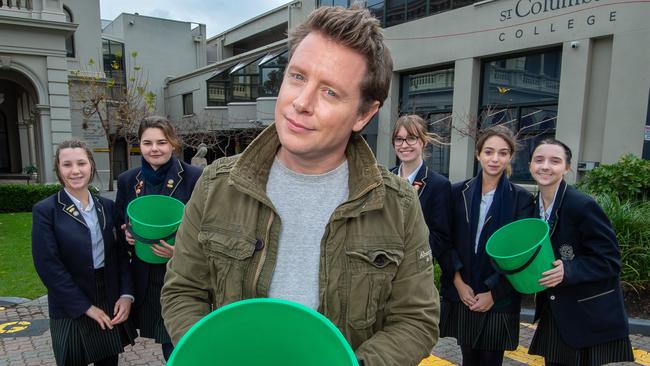Barefoot Investor: Add saving to your bucket list
It’s the strategy that became so popular, even banks are ripping off the idea. This is how you can set up your “buckets” and create a lifelong habit of saving, writes the Barefoot Investor.

Barefoot Investor
Don't miss out on the headlines from Barefoot Investor. Followed categories will be added to My News.
I glanced in the rear-view mirror and saw that my six-year-old had crossed arms and a cross face.
“What’s wrong, cobber?”
He screwed up his little face and pointed his finger at a billboard that we were whizzing past.
“Banking Buckets,” the billboard said.
My son had cottoned on to the fact that Bankwest has been ripping off the “Bucket Strategy” from my book.
(My Bucket Strategy uses zero-fee transaction accounts and linked online savings accounts.)
He was not impressed.
“They should get their own ideas, Dad,” he said.
“Agreed,” I said proudly.
Then, not long after, ME Bank sent a marketing email showing people how to set up their “Splurge” bucket.
I forwarded it to ME Bank’s head of marketing with the subject: “WTF?”
So while I’m as dark as my son at banks shamelessly piggybacking off my book … there’s also a part of me that’s proud of having made saving something worth ripping off.

The bucket strategy — which is so simple it can be scrawled on the back of a serviette — has probably helped well over a million Aussies gain control of their money.
In fact, I’ve created an entire high school money program around them: it’s called “The Bucket List”.
I get the teachers to bring large plastic buckets into the classroom.
I even had one in Perth who drilled a hole in a bucket in front of his class to illustrate the idea of credit cards putting “a hole in your bucket”.
Kids inherently get something as visual as buckets.
And in the program I tell them that I don’t care who they choose to bank with, so long as they go ahead and set their buckets up.
The key is to create a lifelong habit of saving, which of course is the No.1 rule of creating wealth.
And if you, or your kids, have set up your buckets and started saving, well … as Holden says in their more recent television ads: “You Got This!”
Tread Your Own Path!

Q&As
BIG BROTHER BANKS ALREADY WATCHING
DEANNA ASKS: I recently read an article about what CommBank can do with people’s personal data, and I am deeply disturbed.
I would be willing to pay a bank to manage my money and do absolutely nothing with my data just for the right to privacy, but that isn’t how the world rolls these days.
Then again, I don’t like the idea of hiding my cash in a mattress — and my employer won’t pay me in cash.
Do you have any thoughts on this topic? Do I just need to take the metal colander off my head and stop being so paranoid, or is Nineteen Eighty-Four happening already?
BAREFOOT REPLIES: Commbank aren’t messing around.
Earlier this year they announced they’ll invest $5 billion in an app that will give customers ‘nudges’.
Do I trust Commbank to nudge me the right way, or will they nudge me from behind? Who knows? Judging by what was uncovered in the Royal Commission, I’m going to put on a tight pair of pants.
Now, to your question, has Nineteen Eighty-Four already happened?
Of course. Big tech hoovers up all our personal data … well almost all our personal data. The one thing they can’t track right now is what we spend our money on. Yet.
But, Mark my Zuckerbergs, that’s the precious data they’ll all be gunning for in the not-too-distant future.
The banks have finally worked out that they’re really in the technology business, and that they have a giant target on their backs.
HOME IS WHERE THE HYPE IS
LEONARD ASKS: You generally advise your readers to buy a house first and invest later, but I am wondering if this is always the best approach.
I am currently trying to decide whether to invest in a student accommodation apartment.
It costs only $150,000 and I have enough for a 20 per cent deposit. I am thinking the rental income will pay itself off and I can make extra repayments as well.
Meanwhile, I will continue to save up for my house deposit. What would be the risks?
BAREFOOT REPLIES: Be honest: you don’t really want to buy a dog-box in the sky.
What you really want to do is speed up the time it takes to save a house deposit.
Other people try doing it with shares, thinking it’s better to own shares in, say, a bank (and be paid a dividend) than to have money in their miserly savings accounts.
Compared to saving up money in the bank, you can currently earn a higher income from property or shares, but your capital will not be secure.
And that’s the biggest risk you face: a few years down the track you may find a home you really want to buy … but the banks will knock you back because you own a ‘same-same’ student apartment that’s worth less than you paid for it.

CREDIT TRAP A FLIGHT OF FANCY
PENNY ASKS: I am 24 and started my first full-time job this year, as a graduate teacher.
I am travelling soon and my parents recommended I get a credit card for emergencies. As a Barefooter, I have never had a credit card, only debit.
But, as I am planning to have it for travel, not long-term, I applied for a fee-free credit card through my bank, ANZ. I have no credit history, no loans (other than HECS), and no assets other than my savings. Lo and behold, ANZ gave me a $25,000 limit! I was stunned.
BAREFOOT REPLIES: Sweet Mary Magdalene! If you were normal, you might be tempted to max that sucker out.
And if you were normal enough to do that, you’d probably be normal enough to make only the minimum repayments, which (according to the ASIC calculator) would take you … 58 years to pay off, and close to $100,000.
So you’d be debt free when you were 82 years old!
However, I’ve got a feeling you’re anything but normal (the fact that you’re emailing me is a good sign). I’m sure you understand that the bank’s aim is to get you into as much debt as they can, for as long as they can.
If you want to cover yourself for emergencies while travelling, here’s what I’d do instead.
First, make sure you have adequate travel insurance, and some cash set aside for travel emergencies.
Second, call the bank and make them lower your credit card limit to, say, $5000 for your trip, and then close it immediately when you get home.
Don’t get sucked into the idea that a high credit card limit helps your credit score: if anything, these days a high credit card limit hurts your chances of being approved for a loan.
Happy travels!
MARRIAGE, MORTGAGE AND MIDGETS IN TUNE
SAM WRITES: I need to give you a massive thanks: we stuck to the advice in your book and it’s changed our lives.
We saved $160,000 in three years — and that included a year of maternity leave, a wedding, and a baby girl! And, after all that, we’ve just managed to buy a modest home close enough to the Sydney CBD with a 20 per cent deposit.
No family guarantor, just us working and saving. To be honest, it wasn’t that hard — we stuck to the buckets!
So, from someone who was formerly blowing $100 a week on eggs for brekkie in North Bondi, thank you from the bottom of my heart.
BAREFOOT REPLIES: You’re in the thick of the Triple Ms: Marriage, Mortgage, and Midgets!
There are plenty of young couples who throw their hands in the air and say it’s all too hard.
Yet you and your husband have stuck at it for the past three years and that’s why you’re kicking goals.
The Barefoot Investor holds an Australian Financial Services Licence (302081). This is general advice only. It should not replace individual, independent, personal financial advice.
If you have a burning money question, go to barefootinvestor.com and #askbarefoot
The Barefoot Investor for Families: The Only Kids’ Money Guide You’ll Ever Need (HarperCollins)RRP $29.99
Originally published as Barefoot Investor: Add saving to your bucket list


